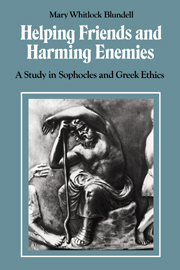2 - Helping friends and harming enemies
Published online by Cambridge University Press: 14 January 2010
Summary
A feud is this way. A man has a quarrel with another man, and kills him; then that other man's brother kills him; then the other brothers, on both sides, goes for one another; then the cousins chip in – and by-and-by everybody's killed off, and there ain't no more feud. But it's kind of slow, and takes a long time.
Mark Twain, Adventures of Huckleberry FinnHelping friends and harming enemies
Greek popular thought is pervaded by the assumption that one should help one's friends and harm one's enemies. These fundamental principles surface continually from Homer onwards and survive well into the Roman period, and indeed to the present day, especially in international relations. They are firmly based on observation of human nature, which yields the conclusion that most human beings do in fact desire to help their friends and harm their enemies, and derive satisfaction from such behaviour. Thus Xenophon's Socrates can count benefiting friends and defeating enemies as one of the things which bring ‘greatest pleasures’ (Mem. 4.5.10).
Friendship, and the desire to help our friends and protect them from hostility, may seem to us as to the Greeks both natural and pleasant. But unlike most of us, they realistically acknowledged that it is also human to be pained by our enemies' success and take pleasure in their downfall. When people see an enemy's dogs or horses admired, says Plutarch, they feel pain; if his land is well worked or his garden flourishing, they groan (Mor. 88b).
- Type
- Chapter
- Information
- Helping Friends and Harming EnemiesA Study in Sophocles and Greek Ethics, pp. 26 - 59Publisher: Cambridge University PressPrint publication year: 1989
- 2
- Cited by



